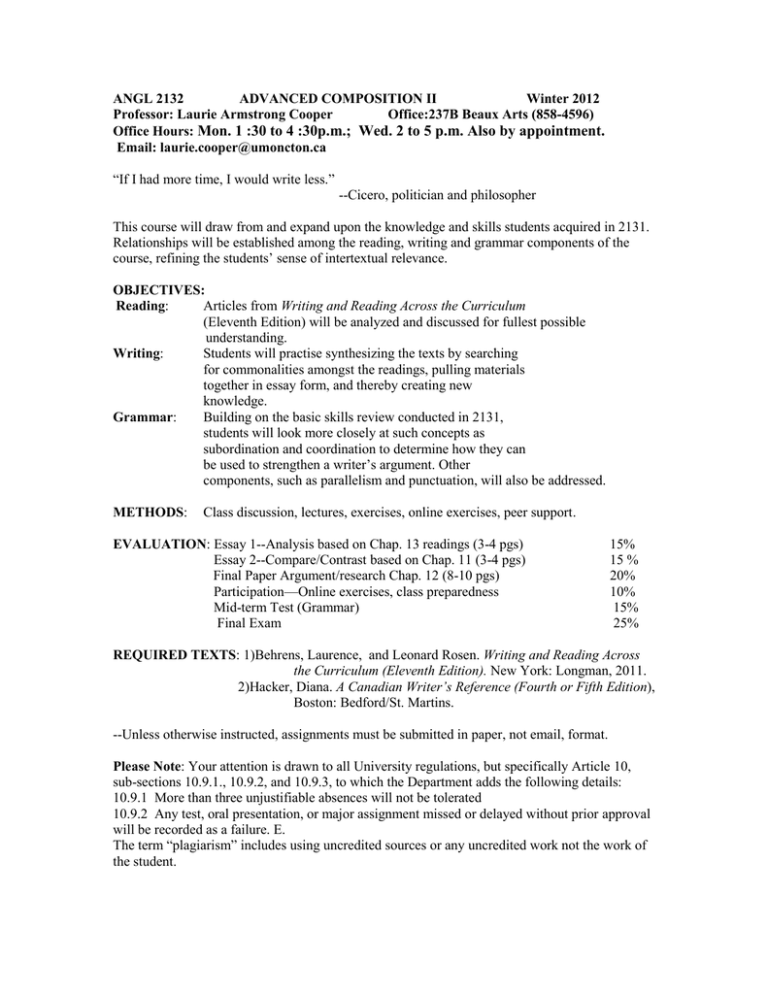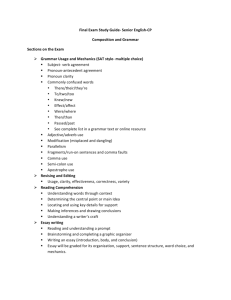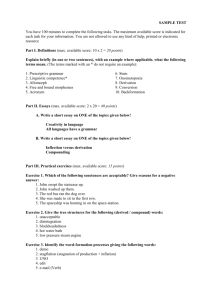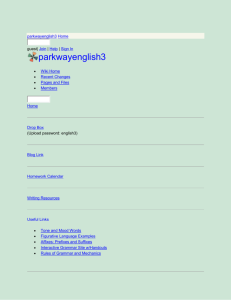ANGL 2132 ADVANCED COMPOSITION II Winter 2012 Professor
advertisement

ANGL 2132 ADVANCED COMPOSITION II Winter 2012 Professor: Laurie Armstrong Cooper Office:237B Beaux Arts (858-4596) Office Hours: Mon. 1 :30 to 4 :30p.m.; Wed. 2 to 5 p.m. Also by appointment. Email: laurie.cooper@umoncton.ca “If I had more time, I would write less.” --Cicero, politician and philosopher This course will draw from and expand upon the knowledge and skills students acquired in 2131. Relationships will be established among the reading, writing and grammar components of the course, refining the students’ sense of intertextual relevance. OBJECTIVES: Reading: Articles from Writing and Reading Across the Curriculum (Eleventh Edition) will be analyzed and discussed for fullest possible understanding. Writing: Students will practise synthesizing the texts by searching for commonalities amongst the readings, pulling materials together in essay form, and thereby creating new knowledge. Grammar: Building on the basic skills review conducted in 2131, students will look more closely at such concepts as subordination and coordination to determine how they can be used to strengthen a writer’s argument. Other components, such as parallelism and punctuation, will also be addressed. METHODS: Class discussion, lectures, exercises, online exercises, peer support. EVALUATION: Essay 1--Analysis based on Chap. 13 readings (3-4 pgs) Essay 2--Compare/Contrast based on Chap. 11 (3-4 pgs) Final Paper Argument/research Chap. 12 (8-10 pgs) Participation—Online exercises, class preparedness Mid-term Test (Grammar) Final Exam 15% 15 % 20% 10% 15% 25% REQUIRED TEXTS: 1)Behrens, Laurence, and Leonard Rosen. Writing and Reading Across the Curriculum (Eleventh Edition). New York: Longman, 2011. 2)Hacker, Diana. A Canadian Writer’s Reference (Fourth or Fifth Edition), Boston: Bedford/St. Martins. --Unless otherwise instructed, assignments must be submitted in paper, not email, format. Please Note: Your attention is drawn to all University regulations, but specifically Article 10, sub-sections 10.9.1., 10.9.2, and 10.9.3, to which the Department adds the following details: 10.9.1 More than three unjustifiable absences will not be tolerated 10.9.2 Any test, oral presentation, or major assignment missed or delayed without prior approval will be recorded as a failure. E. The term “plagiarism” includes using uncredited sources or any uncredited work not the work of the student. Marking Scheme:A+=94-100%; A=90-93%; A-=88=89%; B+=84-87%; B=80-83%; B-=7879%; C+=74-77%; C=70-73; C-=68-69%; D+=64-67%; D=60-63%; E=0-59 This schedule is subject to change during the term. Jan. 12 Introduction. Grammar Review clauses and phrases. Jan. 17 Grammar: Sentence types concluded. Readings discussed: Chapter 13 introduction (680-682); “The Power of Situations” (688-691); “Group Minds” (723-726). Readings discussed: Asch experiment revisited (726-730); “The Perils of Obedience” (692-704). Jan. 19 Grammar. Reading discussed: “The Stanford Prison Experiment” (732-744). Behrens Chapter 6: Analysis. Essay Topics discussed. Jan. 24 Jan. 26 Jan. 31 Grammar. Feb. 2 Grammar. Essay drafts reviewed. Feb. 7 Feb. 9 Essay 1 Due at beginning of class. Grammar. Readings: “New and Improved…”: Chapter 11; “Advertising`s Fifteen Basic…” (539); “Making the Pitch” (558). Feb. 14 Portfolio of TV and Print ads (564-609) discussed. Feb. 16 Compare/Contrast synthesis discussed (Chap. 5). Grammar. Feb. 21 Feb. 23 Grammar. Essay assignment further discussed. Grammar. Essay outlines. Feb. 28 Essay 2 due. Grammar Review. March 1 Midterm. Mar. 5-9 Study Week March 13 Midterms returned and discussed. Readings discussed: Chapter 12 introduced: Fairy Tales (614-645) March 15 Readings: “The Rise of Perrault’s... (645-650); “Princess Paradox...” (666-669); “Cinderella and Princess Culture” (670-673). March 20 March 22 Bettleheim’s “ ‘Cinderella’ : A Story of Sibling Rivalry” (651-658). Grammar. Final essay discussed. March 27 March 29 Grammar Grammar and research project outline. April 3 April 5 April 10 April 12 Sentence style continued. Writing workshop, including documentation. Final paper due. Review for exam Essay 1: Analysis of Obedience to Authority Value 15% Due Date Feb. 7, 2012 Consulting three or four readings from Chapter 13 in Behrens, analyse a principle found within one of these readings. For suggestions see “Synthesis Activities” pages 751-753. Note that personal experience can be applied to an analytical essay. Consider activities 7, 9, and 10 in particular. A model analysis paper can be found on pages 188-191. For more specific instructions on writing analysis, consult pages 192-201. Essay 2: Compare/Contrast of Advertisements Value: 15% Due Date: Feb. 28, 2012 Based on the readings from Chapter 11, this essay asks students to prepare a compare/contrast essay. For essay suggestions, consult the “Synthesis Activities” on pages 609-612, most specifically entries 1 and 2. An outline will be particularly helpful in this assignment. When creating your comparison/contrast outline, follow the examples on pages 174 to 177. Organizing by Criteria (175) is the more effective form of organization for this type of topic compared to the “organizing by source or subject” option (also known as one-side-at-time). As always, the thesis is the most important consideration as it indicates to the reader how the paper has been organized. On page 175, note the paragraph that starts “However you organize your comparisonand-contrast synthesis…” Further on the “so what” question arises; “why bother to compare and contrast in the first place?” (175). This is likely to be answered in a number of ways. On page 565, the editors suggest the ads will get you thinking about why we buy one product over another when there is little difference between the items being sold. As well, they say that “each advertisement is a window into the culture” (565). What do these ads say about our current culture? Our past? This includes gender, target audiences, appeals and assumptions. The shift from ads that are heavily text-based to those that are more visually appealing speaks of a cultural shift and the increasing need for advertisers to grab our fleeting attention spans. Final Paper : Research on Fairy Tales Due Date: April 10, 2012 Value: 20% Approaches to 2132 Final Paper The final paper should be of 6 to 8 pages (excluding the bibliography). While the inspiration for your essay should come from Chapter 12 in the Behrens text, you are not restricted to a further exploration of Cinderella if you do not desire. You can be quite creative with this paper in terms of your topic and how you choose to explore it. Several of the articles in the section can be applied to folktales in general, so keep that in mind (Thompson and some of Cullen’s points can be applied to numerous folktales.) Some of you may want to seek out d’Aulnoy’s “Finette Cendron” : http://www.surlalunefairytales.com/authors/aulnoy/1892/finettecendron.html There is a helpful index of other fairy stories on the site`s home page: http://www.surlalunefairytales.com/sitemap.html Just as the variants of “Cinderella” were fodder for compare/contrast, you can apply some of the same thematic approaches to other work. Go through the comparative categories offered on page 591 of Behrens. Analyzing texts based on levels of violence, relationship, the function of magic, and the ending can an effective way to organize your paper. See pages 674-679 for examples to get you thinking. Particularly, look at the following under synthesis activies—1, 4, 5, and 11. Under research activities check out 2, 4, 5. Remember that you don`t have to choose “Cinderella” as your folk tale. There are many others from different languages and cultures—you can apply some the readings to this where possible. You can look at folklore and how it relates to film, videogames and other forms. Those of you who are J.K. Rowling fans can analyze her book of Potterworld-based tales in her short work Beedle the Bard. You can also research through Scholar Google. Search by going to www.scholar.google.com and then typing in key words. Some articles are available in their entirety. Others might be available through the library. Here are a couple of articles or book excerpts that I thought some of you might find interesting/useful: “On Fairy Stories” by J.R.R. Tolkien Part of Jack Zipes book Breaking the Magic Spell Radical Theories of Folk and Fairy Tales






